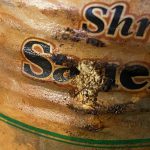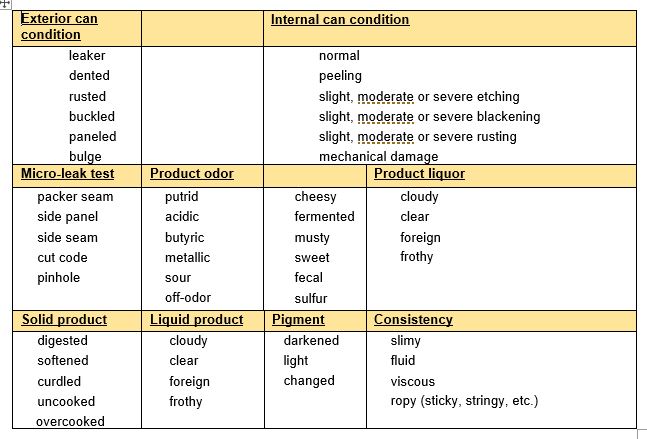It started with a visible dark line running down the pantry wall. My eye traced the dark line up to an upper shelf, only to realize a can of food was leaking. My first reaction was, “Oh, no! Botulism!” then I quickly recognized that the guilty can contained a highly acidic food, which hinders the growth of Clostridium botulinum, the bacterium that causes botulism.
A yeast more likely caused the line creeping along the wall. However, it still made for a fun afternoon of cleaning and inspecting every remaining can in the pantry.
As the photo illustrates, the can was leaking from a tiny, indecipherable breach. Perhaps there was a small dent in the can when it was purchased. Maybe it was dropped and the damage went unnoticed. However, one thing that is certain is that purchasing and storing a damaged can is cause for concern. Dents, punctures, or even rough handling can compromise the integrity of a can, which can lead to leaks and contamination.
The Food and Drug Administration (FDA) monitors the safety and integrity of canned foods. The incidence of spoilage in canned foods is low, but when it occurs, it is important to know what to do. In most cases, the best actions to take are to discard the food immediately and thoroughly clean any contaminated areas. NEVER open a bulging or leaking can. Wear protective equipment, especially gloves, when handling damaged and leaking cans.
The table below includes useful descriptive terms used in the canned food industry – it is a helpful tool for the consumer, too.
From a cursory glance, I learned externally, my can was a leaker. The can was ever so slightly dented; perhaps the dent caused a weakness, the can rusted, and the liquid started to drain out.
Because of this canned food misadventure, my pantry got an early spring-cleaning. All the items around the offending can were removed, inspected, and thoroughly cleaned. The shelves and walls were also cleaned to remove any residue.
Cleaning the pantry should not just be done when something leaks, however. The cans and boxes in the pantry should be regularly rotated (first in, first out: FIFO) as well as inspected for pests and/or damage, and the shelves and walls should be periodically cleaned to help prevent any cross-contamination.
Other than leakage, mold, or other obvious clues that canned food is spoiled, there are other signs as well, some of which may not be noticeable until after the can is opened. Some of these include:
- The can lid does not seem attached correctly: it moves when touched or is bulging.
- The food spurts out when the can is opened.
- The can is rusting or corroded. Both rust and corrosion will eventually create tiny holes that let both air and bacteria into the food can.
- Dents: dents compromise the integrity of metal, causing a breach. Even the smallest breach in the can may lead to contamination and spoilage.
- Sound: an unnatural, loud hiss when the can is opened can be a sign of unwanted fermentation or other biological processes.
- Unpleasant smells are a good way to detect possible spoilage, even if the food still looks good.
Visual inspections are important in the food world. Do not wait until there is a mess in the pantry before taking an inventory and weeding out the old and damaged products. It is important to rotate even canned food to keep it from sitting too long. Store newer items behind older ones to ensure items are used before their expiration dates.
Resource: https://www.fda.gov/food/laboratory-methods-food/bam-chapter-21a-examination-canned-foods
For more information about food safety and proper food storage, please contact:
Heidi Copeland, Leon County Extension Office, 850.606.5229.
Samantha Kennedy, Wakulla County Extension Office, 850.926.3931
- It’s Chestnut Season! - December 16, 2022
- Persimmons: Food of the Gods - November 23, 2022
- Have You Ever Thought About Entering Baked Goods in the North Florida Fair? - October 28, 2022


